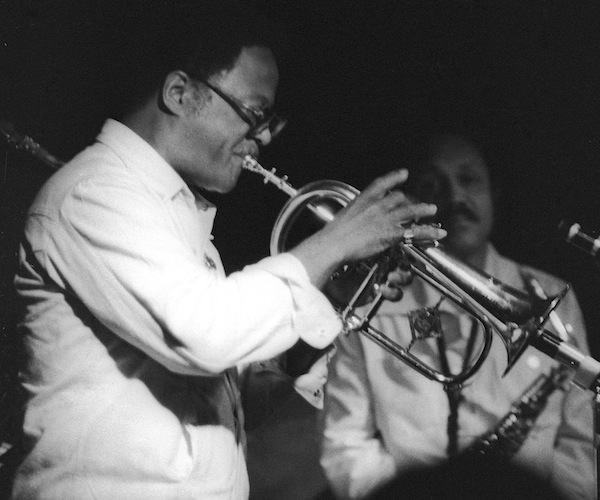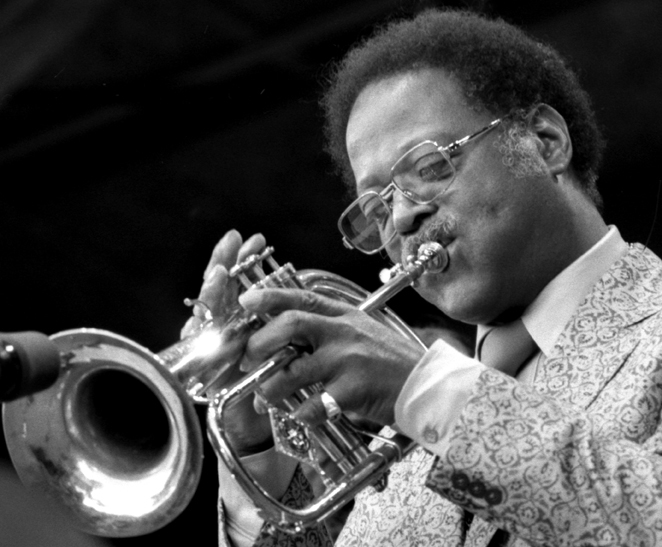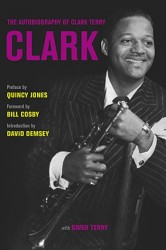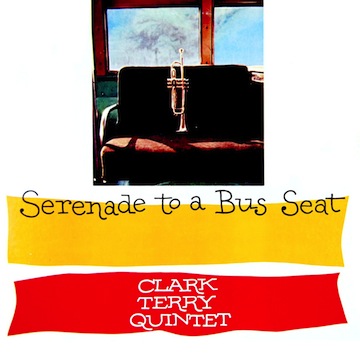Jazz Remembrance: Jazz Trumpeter Extraordinaire Clark Terry
Gradually, Clark Terry developed on the trumpet the rounded, full tone that became so distinctive.

The late Clark Terry — a man with life in him and his horn. Photo: Michael Ullman.
By Michael Ullman
As I write this the funeral of the late Clark Terry, who died on February 21st at the age of 94, is being held at Harlem’s Abyssinian Baptist Church. The trumpet player (he also helped popularize the flugelhorn) was, as Sidney Bechet liked to say about the few people he admired, a man with a life in him. Quincy Jones, whom Terry mentored when Q was a child, put it a different way: “He’s never been afraid to get wet when it rains.” He was unique, as a trumpet player and as a man. Though he didn’t start recording until his mid 20s, he took part in over 900 recording sessions. When in his later years he could no longer play his demanding instrument, he cheerily turned to teaching, leading big bands of youngsters, mentoring others, and encouraging just about everybody. He was the victim, as were many others, of withering and sometimes violent racist acts…he was once left unconscious in the Mississippi mud after an unprovoked attack by a security guard. But he perservered. His motto was “Keep on keepin’ on.”
He kept on, becoming a virtuoso instrumentalist with a uniquely warm, rounded tone as well as the first African-American hired by the NBC orchestra. He was a dead serious trumpeter with a comic side that he let loose in his infinitely popular vocal, “Mumbles,” in which he mumbled in a nearly articulate manner as if he hadn’t quite figured out speech. His singing echoed his trumpet playing: he had a characteristic way of scrambling up a scale in a stuttering fashion as if he were rock climbing. How die he come up with this athletic approach to shaping his solos? It was with the first prestigious big band he worked with, led by the now forgotten George Hudson. The band opened in the Club Plantation: “Man! I played my solos with all the fervor that I could muster. Mixing in comedic overtones that made the cats laugh, then closing my eyes and taking off with technical phrasing that shocked everybody—even me.” There was always humor, or perhaps humanity is a better phrase, in even his most technically adept playing.
His early years were difficult, almost impossibly so. He was born in St. Louis, the seventh of eleven children. His mom died when he was young, and he was raised until he was 12 by his oldest sisters and by his physically abusive dad. “The only person I knew who didn’t love jazz was my old man.” On the other hand, “Jazz was everywhere in my hometown…I heard it on the radio, in parades, in the parks, in my neighborhood at block parties, and the Friday night fish fries, and from the riverboats that I watched from the banks of the Mississippi.” His father, also named Clark Terry, beat his son regularly, and had other nasty quirks. When his son showed an interest in the trumpet, he said “Rotten on that shit,” and told him about a cousin who got tuberculosis, presumably from playing the trumpet. It was a no-frills existence: the family lived in homes without electricity and his father didn’t believe in Christmas presents. When Terry bought a used bicycle, his dad warned him, through his siblings, not to come home again. The boy didn’t: he went to relatives who then brought him up.

Clark Terry at the Monterey Jazz Festival, 1981. Photo: Bob McMillen.
His first trumpet, if one could call it that, was homemade. In his autobiography, Terry tells of hearing a Duke Ellington recording on a “graphaphone.” He was mesmerized and, along with a friend inelegantly nicknamed Shitty, went to a junkyard: “My friend Shitty helped me find the pieces on a blazing hot summer day in 1931. I coiled up an old garden hose into the shape of a trumpeter and bound it in three places with wire to make it look like it had valves.” He made a kind of mouthpiece out of a lead pipe, and blew on his creation until his lips bled. His neighbors chipped in to buy him a used trumpet, and his brother-in-law gave him lessons. When Terry made it to high school, he was handed a valve trombone. He soon talked his way into becoming a trumpet player, and started putting together his own bands. The rest of his early career describes a slow, steady climb into the front ranks. He played with a carnival band…the one that took him to Mississippi. He also played with the cantankerous bandleader Fate Marable, who once had hired a teen-aged Louis Armstrong to play on the steamboats with him. He endured slights, and what we would now called hazing. He persevered.
Gradually, Terry developed the rounded, full tone that became so distinctive. Historians have talked about his instrument’s sound as if it was a legacy of St. Louis, where trumpeters learned to play without vibrato. Terry himself had a slightly different explanation. He recycles a famous tale about the young boy he called Dewey (Miles Davis). Davis was playing for a famous teacher, Elwood Buchanan, who advised him to eschew the vibrato because when he grew older he’d shake enough. Perhaps that advice also influenced Terry. But repeatedly in his autobiography he mentions with admiration the tones of the trumpets and flugelhorns in the famous Jimmy Lunceford big band: “I had always wanted to play in that band. They had such mellow sounds on those flugelhorns. Melliflous. The type of sound I wanted to perfect. I’d fallen in love with that sound a long time ago, tried to duplicate it all kinds of ways, with felt over the bell of my horn, hats, anything I could find that could make that smooth, rich sound.” A fellow trumpet player advised him to get a deeper mouthpiece. Eventually he found the sound he wanted on trumpet as well as on flugelhorn.

He practiced incessantly, and developed a technical fluidity that complemented his smooth, rich sound. I was once sitting in the front row at the side of the stage at Sandy’s Jazz Revival in Boston where Terry was performing. He sat down at the edge of the stage beside me and started warming up with a series of rapid scales, arpeggios, and bebop phrases played with a rapidly and a precision that astonished me. Most impressively, he played everything at a whisper: the person beside me couldn’t hear him. Afterwards I told Terry that that warmup was as impressive as anything he had done on stage: he smiled and nodded his head.
He was leaving adolescence towards the end of the swing era. In the war, he was lucky enough to be assigned to a camp where he trained other bands. But bebop was on its way. His first recordings were V-discs (Victory discs, made for the armed forces to keep their spirits up). The discs included a rendition of Louis Armstrong’s specialty, “On the Sunnyside of the Street,” and Charlie Parker’s “Billie’s Bounce.” He hit what was then the big time when Charlie Barnet hired him: the latter had a hit with his weighty tenor saxophone solo on “Cherokee.” In 1945, Charlie Parker gave the tune wings and called it “Koko.” Terry soon went to Count Basie’s small band. He explains why Basie’s group of musicians shrank: Basie lost so much money betting on horses that he had to downsize. In 1951, Terry got his dream job with Duke Ellington. He spent 8 years with Ellington, while also recording under his own name and behind scores of great musicians, including Billie Holiday. Sarah Vaughan, and Dinah Washington.
Ellington knew what he had. He used all his charm to pry Terry loose from Basie’s band, and he used everything he had to keep him when Terry decided to go on his own. Ellington seemed most to appreciate Terry’s speed and boppish phrasings. The trumpeter is featured mastering the rapid tempo of “Duke’s Newport Up,” found on the bandleader’s Ellington at Newport. Ellington wrote “Juniflip” for Terry, who admits he doesn’t know what the title means either. (It is available on Live at Newport, 1958, Columbia.)

A favorite Clark Terry album that features hard-driving saxophonist Johnny Griffin in the line-up.
It’s hard to choose amongst Terry’s remarkably consistent recordings, but the records he made in the ’50s are the standouts, including In Orbit (Riverside) which features a remarkably subdued Thelonious Monk on piano. In various reissues, producer Orrin Keepnews has confessed his astonishment that Monk, then a star, would consent to appear as a sideman: it’s a tribute to the respect Terry received universally, and the love as well. His Serenade to a Bus Seat (Riverside) is a hard-bopping album with saxophonist Johnny Griffin. The title suggests another of Terry’s interests: he appeared in as many fund-raising events for civil rights groups as anyone could. I was lucky enough to hear Terry perform at Birdland (it must have been 1963-4) with the Gerry Mulligan big band that also featured valve trombonist Bob Brookmeyer, an equally witty, accomplished instrumentalist-composer. The two co-led their own groups, and meshed perfectly. Clark Terry/Bob Brookmeyer Quintet: Complete Studio Recordings (Lonehill) includes the funky “Blindman, Blindman,” the folksy “Weep,” “Monk’s Straight, No Chaser,” and a remarkable rendition of “Battle Hymn of the Republic.”
He grew up on big bands, but Terry thrived in intimate settings. He made duet recordings with Oscar Peterson (Oscar Peterson and Clark Terry, Pablo), with drummer Max Roach (Friendship, Columbia), and brilliantly with bassist Red Mitchell, including Jive at Five (Enja). The Mitchell recordings are among my favorites.
He was, as one can tell from any of the tributes to the man, an almost inconceivably energetic, and positive, person. He talked about teaching, privately and at William Paterson University, with the fervor of a born-again preacher: it was his second passion. Things happened around him: he made them happen. Describing his home during his last years, Terry enthused that the house “stayed jumping.” He had some regrets. Once Dewey (Miles Davis) came up to him and asked him a question about trumpet playing and he fluffed him off. He remembered that ungracious act for the rest of his life and vowed not to treat anybody like that ever again. He regretted not having reconciled with his father and his continuing problems with his first son, born when Terry was 16 or 17. He also regretted, perhaps less seriously, that he lost touch with his friend Shitty.
In his last years, Terry wrote his Autobiography of Clark Terry, and was the subject of a touching documentary, mostly about his teaching: Keep On Keepin’ On. His autobiography ends with dozens of pages of tributes to other people: to Quincy Jones, to Billy Taylor, to those who motivated him, and to all the musicians he ever played with. He wrote, “I’d learned a long time ago…when there’s nothing you can do about a situation, you can’t let that stop you. You gotta keep on keepin’ on! So that’s what I did. I kept on playing my blues away, just like I’d done when I was a boy in St. Louis, dreaming about playing all over the world.” Today his friends and students, colleagues and admirers, are all grieving the loss of someone irreplaceable. And, one hopes, they are keepin’ on.
Michael Ullman studied classical clarinet and was educated at Harvard, the University of Chicago, and the U. of Michigan, from which he received a PhD in English. The author or co-author of two books on jazz, he has written on jazz and classical music for The Atlantic Monthly, The New Republic, High Fidelity, Stereophile, The Boston Phoenix, The Boston Globe and other venues. His articles on Dickens, Joyce, Kipling, and others have appeared in academic journals. For over 20 years, he has written a bi-monthly jazz column for Fanfare Magazine, for which he also reviews classical music. At Tufts University, he teaches mostly modernist writers in the English Department and jazz and blues history in the Music Department. He plays piano badly.
